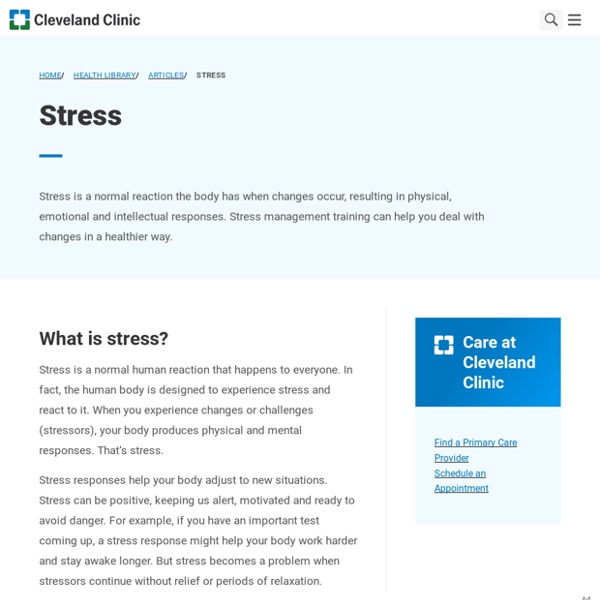Coping one day and crying the next: Work-related burnout is real
SINGAPORE: One day at work, Ms Jamuna Raj was striking off “to-dos” from a neat hand-written list, thinking she had a lid on all her tasks at work. But the next day, she was bawling when her boss asked her if she was okay. The 31-year-old, who was handling multiple roles in client management, events, editorial management and production in a small publishing house, did not know what sparked it, but it was the start of her journey towards realising that she was experiencing burnout. “I was striking the to-dos off, but for every one that I did, there were five more. Still, because I was striking things out, I thought I could handle it,” she told CNA.
Stress Symptoms, Signs, and Causes
In today’s fast-paced world, chronic stress is common, but your mind and body can pay a high price. Learn to recognize overwhelming stress—and what you can do about it. What is stress?
Cleveland Clinic: Ready to Snap? 7 Tips for Stressed-Out Parents
You work hard in a high-stress job. You fight traffic to pick your kids up from daycare, school or sports. Then you go from chauffeur to chef at home.
TODAYonline
SINGAPORE — Singaporeans are not only sleep deprived, but they are also among the most stressed at work globally, according to a survey by health service company Cigna released on Tuesday (Mar 26). Nearly 92 per cent of Singaporeans surveyed were stressed from work, which was higher than the global average of 84 per cent. Of this group, 13 per cent said that the stress they faced was unmanageable. Singaporeans’ physical wellness index also dipped by 4.4 percentage points from last year, which the survey attributed to an increase in sleepless nights.
stress – APA Dictionary of Psychology
n. 1. the physiological or psychological response to internal or external stressors. Stress involves changes affecting nearly every system of the body, influencing how people feel and behave. For example, it may be manifested by palpitations, sweating, dry mouth, shortness of breath, fidgeting, accelerated speech, augmentation of negative emotions (if already being experienced), and longer duration of stress fatigue. Severe stress is manifested by the general adaptation syndrome. By causing these mind–body changes, stress contributes directly to psychological and physiological disorder and disease and affects mental and physical health, reducing quality of life.
Optimism and your health
Look for the silver lining... Buddy DeSylva's upbeat lyrics to Jerome Kern's lovely tune provide an appealing call to a positive outlook on life, even in the face of adversity. Indeed, a cheerful disposition can help you get through the tough patches that cloud every life, but do people who see the glass half-full also enjoy better health than gloomy types who see it half-empty? According to a series of studies from the U.S. and Europe, the answer is yes.
American Psychological Association: Managing stress for a healthy family
As the nation continues to face high-levels of stress, families are susceptible to mounting pressures from finances and work. Raising a family can be rewarding and demanding even in healthy social and economic climates, so stressful times can make things much more challenging. According to APA's Stress in America surveyvdzsazaavd, 73 percent of parents report family responsibilities as a significant source of stress. It was also found that over two-thirds of parents think their stress level has slight to no impact on their child’s stress level. However, only 14 percent of tweens and teens reported that they are not bothered when their parent is stressed.
62 Stress Management Techniques, Strategies & Activities
What happens when we continue “burning the candle at both ends” until we reach physical and emotional exhaustion? Just like the candle itself, we risk burning ourselves out. There is a parable of a frog sitting in a pot on the stove.
160,000 Singaporeans hospitalised from stress every year, with over 14 million stress-related doctor visits: report, Business Insider - Business Insider Singapore
One in every three GP visits here is linked to stress-related conditions, a healthcare report has found. Pixabay Feeling stressed right now?
Exercise: 7 benefits of regular physical activity
Exercise: 7 benefits of regular physical activity You know exercise is good for you, but do you know how good? From boosting your mood to improving your sex life, find out how exercise can improve your life. By Mayo Clinic Staff
TODAYonline
SINGAPORE — When parents are constantly stressed about raising their little ones, it could impair their parent-child relationship in the long run. Mothers who reported higher levels of parenting stress, for example, had a weaker connection with their child. These were some of the key findings of a new study done by researchers from the Nanyang Technological University (NTU). By assessing the level of stress among mothers, and then monitoring their brain activity and that of their children while they were watching short animation clips, the researchers observed that mothers who posted higher levels of parenting stress had less synchrony in brain activity with their child. The brain region monitored during the study was the mother and child’s prefrontal cortex, which is associated with the ability to understand other people’s opinions, emotions and values. “What our study shows is that sometimes, that stress itself is counterproductive to what you’re trying to achieve.”
How to handle stress at work
If you’re currently working, you probably know what it feels like to be stressed on the job. A must-do project arrives without warning. Three emails stack up for each one you delete.



